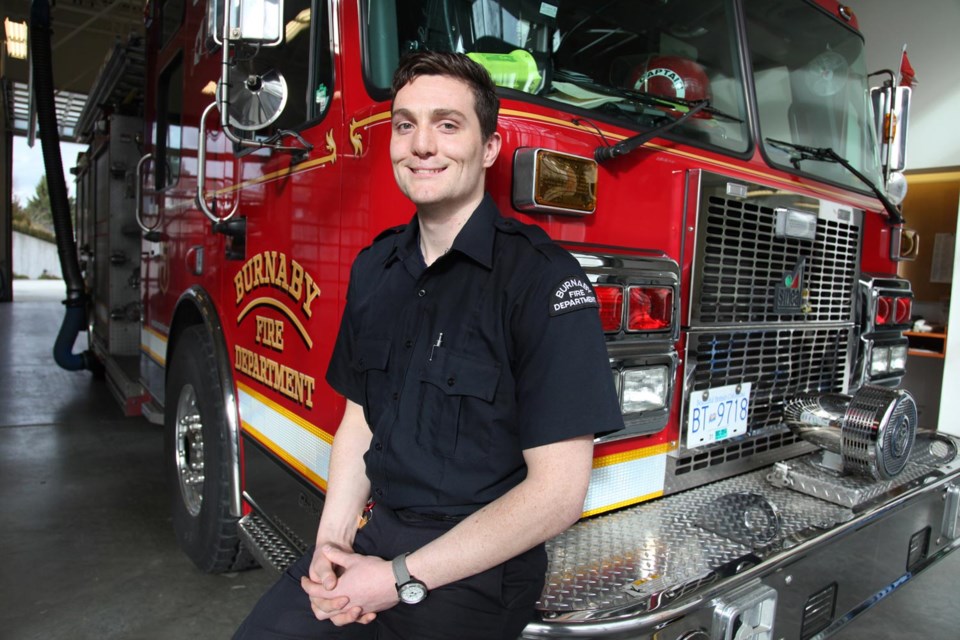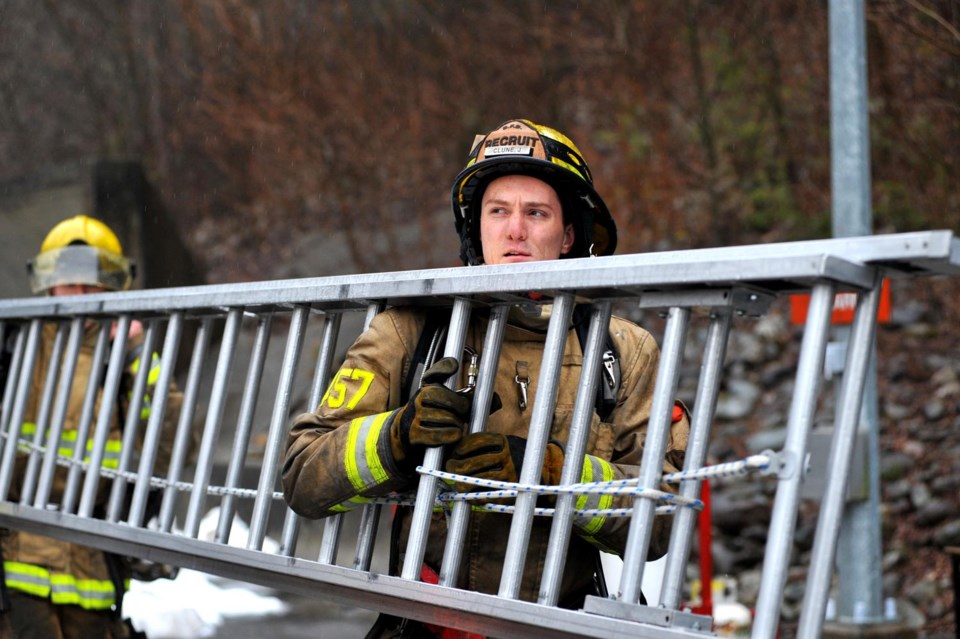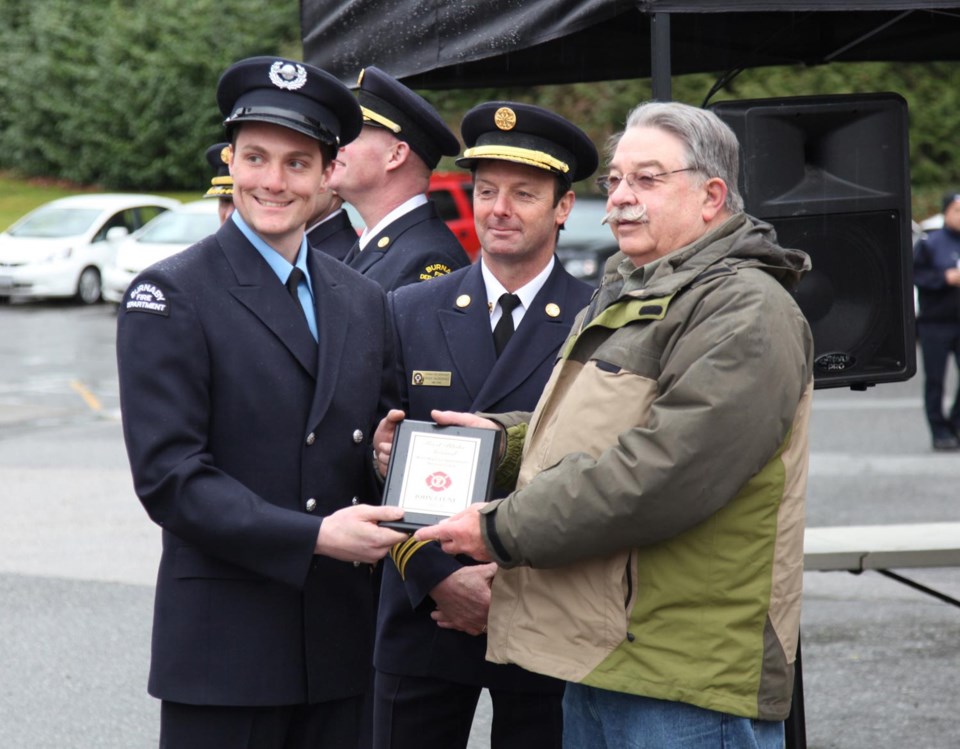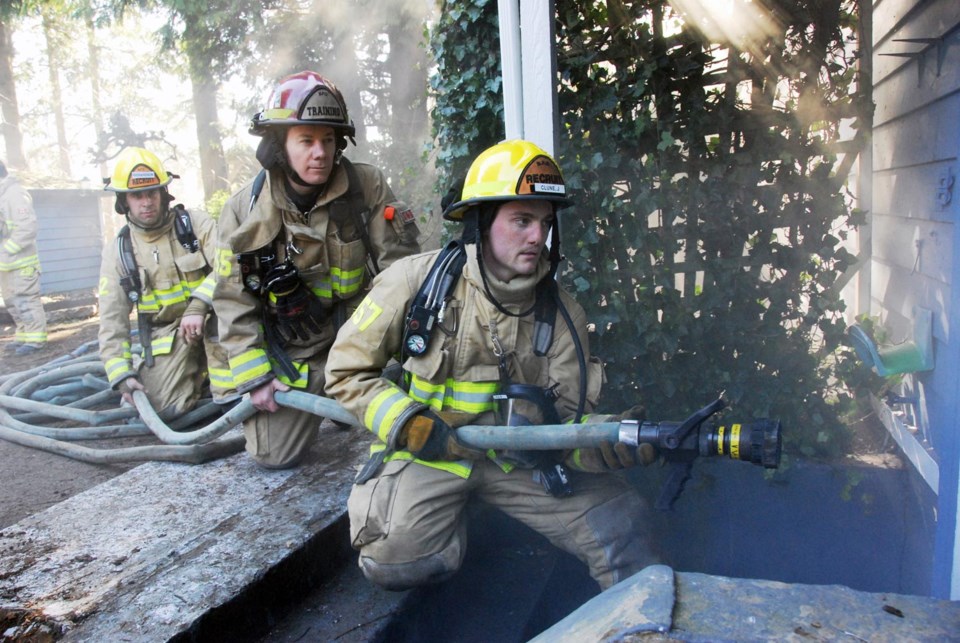What does it take to make the grade in the Burnaby Fire Department? Burnaby NOW reporter Cayley Dobie sat down with two Burnaby training officers, two of the department’s 2014 recruits and the director of the fire and safety division at the Justice Institute of B.C. to find out what all the fuss was about the Burnaby Fire Department. In this, the second instalment of her series, she talks with John Clune, a new recruit.
*
Imagine you had two uncles, and one of your uncles was a police officer and the other was a soldier in the British army. Now imagine they both wanted you to follow in their footsteps – what would you do?
Well, that was the exact situation John Clune found himself in several years ago, but instead of picking sides, the 24-year-old decided to break from tradition and become a firefighter.
Clune applied to the Burnaby Fire Department recruitment program in August 2012 after attending fire school in Texas. Clune also completed several courses with WorkSafeBC and the Justice Institute of B.C. and earned a diploma in marketing from BCIT.
When the Burnaby Fire Department approved his application, Clune spent nearly a year participating in ride-alongs and interviews with the expectation that he would one day become a firefighter.
So, when Clune was put on a waitlist in 2013, he was worried he hadn’t made it. Lucky for him, the department was so impressed with Clune and the others waitlisted that the fire trainers decided to offer them a second chance.
About 11 people were invited back to the department to participate in a mini-recruitment session and of that group, seven were hired – Clune was one of them.

In January, Clune and six other recruits began the nine-week recruit training under the guidance of Cpt. Dave Samson and Lt. Darcy O’Riordan.
The NOW recently caught up with Clune to chat about the recruitment process and what it took to become a Burnaby firefighter.
Cayley Dobie: Why firefighting?
John Clune:My dad was on a soccer team surrounded by firefighters and I was drawn to their personalities, and I had coaches throughout my entire soccer youth that were all firefighters. They were all just awesome guys, and I idolized them and wanted to be like them.
CD:Describe your application experience.
JC:Burnaby’s process is super in-depth. We put in the application and then there is a panel interview, in there was a representative from (human resources), one of the assistant chiefs and then one of the presidents of the union. So, they interviewed us first and when we passed through that, they had two orientation days to kind of introduce us to how Burnaby does things as far as skills and stuff. If we passed through that, we had to do four different ride-along shifts throughout February 2013, and if we passed through that we had to do a physical test and passing through that was a chief’s interview. So all of us did all of that and then we got shortlisted and then they said, ‘OK, we’ll do a miniature hiring process in September 2013,’ and I think there was about 11 of us on that list, and in October of 2013 the seven of us found out we got hired.
CD:Did you only apply in Burnaby?
JC:I did until I got shortlisted. Once I got shortlisted, for me it meant more to be a Burnaby firefighter than anywhere else.
When you’re starting to try out, obviously you’re applying to all cities because you want to be a firefighter. So looking and comparing it, not everybody does it this way, so it was just another one of those signs that I’m really in the right spot. Because if they care about who they hire this much, you know they’re hiring the right people.
CD:What challenges did you experience when applying?
JC:There’s a lot. Trying to think about what ways that I can improve myself, what ways that I need to try and stand out, but a lot of it’s also knowing that you’ve got to be part of a team so no matter what. Yes, it’s important to be your best, but you also need to know that you got a bunch of other guys around you that you need to help out as well.
They’re only taking seven, so it’s like I need to do something to be that top seven. For me, it was taking extra courses and just being around the like-minded guys, it really gets you thinking in that mentality of constantly training and bettering yourself.
CD:How was your first day of recruit training?
JC:It was tiring but good. You felt satisfied at the end of the day. … t was kind of surreal. It was weird being there and like you finally had it, and it’s something you’ve been trying for a number of years to get and achieve, and then you’re actually doing it.
I was going home and calling my parents and saying: ‘Hey, this is what I did today!’ Just super excited the whole time.

CD:Was there anything unique about training?
JC:I found a lot of comfort in the fact that we saw other crews training while we're training, and so you get the idea that it's like, just because we're graduated doesn't mean now you know it all or now you're done training.
That's one thing in particular that I've noticed about being here (Burnaby) is that everybody is training all the time.
CD:What's been your favourite part of training?
JC:When we got our gear and seeing my last name on the back of the jacket, I was just like 'Woa.' They gave us the stuff the first day and that was just, wow.
Doing all the drills has been so much fun too, but also knowing how you're going to apply it has been a blast.
CD:What do expect the most rewarding part of firefighting will be?
JC:I think the most rewarding part is going to be is going to be why we all got into it in the first place, it's going to be helping people. Talking to all the recruits it's been the same way where we all want to be there for people because for us that's the drive. You have to be at your best when it's somebody's worst day. Being able to walk away and have that (feeling) that I helped or I tried to help, that can be huge. That'll be the most satisfying but also probably the hardest times, where you can't help, but knowing that you're going to do all you can to do it.

CD:What do you think your first call will be like?
JC:It’s going to be different. Right now we’re doing first aid and it’s like, OK they’re a drowning victim, and they’re wet so you know you have to dry them off. It’s hard to imagine but seeing the actual thing, that in itself will be a different challenge.
I don’t know what it’s going to be like but I think that’s part of the excitement. I’m looking forward to it.



